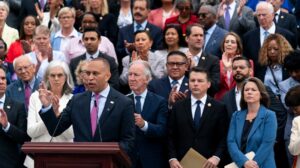
In a landmark decision that could have far-reaching implications for political discourse, Representative Laurel Libby has emerged victorious in a free speech case that has captured the attention of both local and national observers. The ruling, delivered last week in Augusta, underscores the pivotal role of free expression in the democratic process and has been hailed as a triumph by supporters of the Republican lawmaker.
Rep. Libby, known for her outspoken advocacy on various issues, faced legal challenges after her public statements were scrutinized by political opponents. The court’s decision to uphold her right to free speech is being celebrated as a significant affirmation of constitutional rights. This outcome is particularly relevant as the political climate in Augusta becomes increasingly charged ahead of upcoming elections.
Background on the Case
The case against Rep. Libby centered on remarks she made during a heated debate over state policy. Critics argued that her comments were inflammatory and sought to curtail her ability to speak freely. However, the court found that her statements were protected under the First Amendment, setting a precedent for similar cases in the future.
This development follows a series of legal battles across the country where politicians have been challenged over their public statements. The decision in Libby’s favor highlights the ongoing tension between free expression and the regulation of speech, especially in the political arena.
Expert Opinions and Implications
Legal experts have weighed in on the significance of the ruling, noting its potential to influence future cases involving political speech. According to Dr. Emily Carter, a constitutional law professor at the University of Maine, the decision “reaffirms the fundamental principle that political discourse must remain robust and uninhibited.”
“This ruling is a reminder that free speech is a cornerstone of our democracy, and attempts to silence political figures can have a chilling effect on public debate,” Dr. Carter stated.
Meanwhile, political analysts suggest that the decision could embolden other lawmakers to speak more freely, knowing that the courts may protect their rights to express controversial or unpopular opinions.
Historical Parallels and Future Outlook
The outcome of Rep. Libby’s case draws parallels to historical instances where free speech was defended in the face of opposition. Notably, the case echoes past Supreme Court decisions that have safeguarded the rights of individuals to express dissenting views, even when those views are unpopular.
As the political landscape continues to evolve, the ruling may serve as a touchstone for future debates about the limits of free speech in political contexts. Advocates for free expression argue that such protections are essential for fostering a vibrant democracy where diverse viewpoints can be heard and considered.
Next Steps and Broader Impact
With the court’s decision now public, attention turns to how this ruling will influence upcoming elections in Augusta and beyond. Supporters of Rep. Libby are rallying around her victory as a call to action, urging voters to support candidates who prioritize free speech and individual liberties.
As the debate over free expression continues to unfold, the case of Rep. Libby serves as a potent reminder of the enduring importance of protecting the rights enshrined in the Constitution. For voters and politicians alike, the implications of this decision will likely resonate for years to come, shaping the contours of political discourse in Maine and across the United States.






